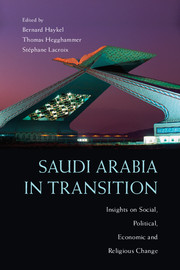Book contents
10 - The Struggle for Authority
The Shaykhs of Jihadi-Salafism in Saudi Arabia, 1997–2003
Published online by Cambridge University Press: 05 January 2015
Summary
Introduction
Toward the end of the 1990s a new group of religious scholars emerged in Saudi Arabia. These scholars, who embraced a similar ideology and were well connected to each other, offered religious justification and support to all Jihadi groups throughout the world, and their fatwas, statements, and books provided the ideological justification for the Jihadi-Salafis, including al-Qaeda. It was the first time in the modern history that Saudi scholars found themselves becoming global ideologues for the jihadis, who began referring to this group of scholars as the “shaykhs of Jihadi-Salafism” (shuyukh al-Salafiyya al-Jihadiyya).
In this chapter I propose to examine how these shaykhs sought to establish their religious authority, and how they interacted with other centers of power, such as the Saudi king’s office, the official Saudi ulama, and with the “Islamic Awakening” (Sahwa) leaders, who represented a Saudi movement influenced by the Muslim Brotherhood. I have selected for study three of Jihadi-Salafism’s most important Saudi shaykhs: Humud b. Abd Allah al-`Uqla al-Shu`aybi (1927–2002), Nasir b. Hamad al-Fahd (b. 1969), and `Ali b. Khudayr al-Khudayr (b. 1955). These were the most active and influential shaykhs in the new movement and were prolific in expressing their opinions on domestic and international matters. Although several lesser important Jihadi-Salafi scholars are worth noting, such as Sulayman al-`Ulwan, `Abd al-`Aziz al-Jarbu`, and Ahmad al-Khalidi, the three aforementioned shaykhs – al-Shu`aybi, al-Fahd, and al-Khudayr – constitute a cohesive group that held the same views and acted in unison from 1999 to 2002. As such, they can be understood as constituting a unit in addition to being the most important Saudi scholars for the Jihadi-Salafi movement.
- Type
- Chapter
- Information
- Saudi Arabia in TransitionInsights on Social, Political, Economic and Religious Change, pp. 181 - 206Publisher: Cambridge University PressPrint publication year: 2015
References
- 3
- Cited by



